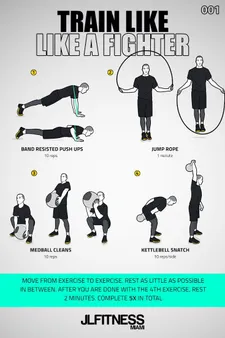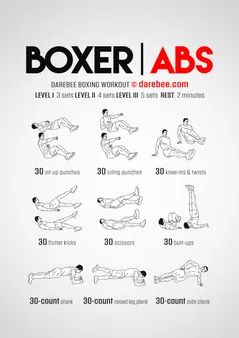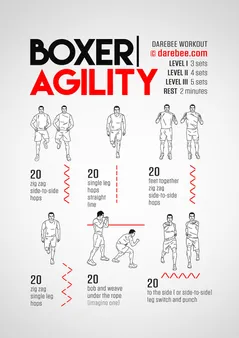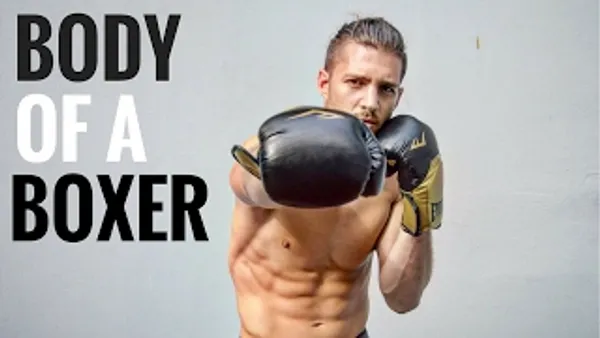Table of Contents
Step into the ring and embark on a transformative journey as you learn How to train like a boxer. Discover the secrets of this demanding sport and unlock your inner champion. From mastering essential techniques to developing speed, power, and endurance, this comprehensive guide will equip you with the knowledge and skills needed to excel in the ring and beyond. Whether you're a seasoned athlete seeking to refine your craft or a beginner eager to embrace the challenge, prepare to elevate your fitness and unleash your full potential.
How to Train Like a Boxer: Unleash Your Inner Champion
I. Mastering the Fundamentals of Boxing Training
Laying the Foundation: Essential Techniques and Drills
Embarking on the path of a boxer requires a solid foundation in the fundamentals of the sport. These foundational elements serve as the building blocks upon which more advanced techniques and strategies can be constructed. Whether you aspire to compete in the ring or simply seek to enhance your fitness and self-defense skills, mastering these basics is paramount.
One of the cornerstones of boxing is the proper stance. This stance provides stability, balance, and agility, enabling you to move swiftly and strike effectively. The orthodox stance, with the left foot forward and the right foot back, is commonly adopted by right-handed boxers, while southpaws mirror this stance with the right foot forward. Regardless of your stance, maintaining a slight bend in your knees and keeping your weight evenly distributed is crucial.
- Related Post: How to Choose the Right Boxing Gym and Trainer
- Related Post: The Benefits of Boxing for Physical and Mental Health
Perfecting Punches: Accuracy, Power, and Timing
The ability to deliver powerful and accurate punches is a hallmark of a skilled boxer. Mastering the jab, cross, hook, and uppercut, the four fundamental punches in boxing, is essential. The jab, a quick and straight punch, serves as a range-finder and sets up more powerful punches. The cross, a powerful straight punch thrown with the rear hand, is a staple of boxing combinations. The hook, a short, looping punch thrown with the lead hand, targets the opponent's head or body. The uppercut, a rising punch thrown from below, is particularly effective against opponents with a lower guard.
Beyond technique, developing punching power and timing is crucial. Power is generated through proper footwork, body rotation, and coordination. Timing, the ability to land punches at the right moment, is honed through practice and experience. Mastering these elements will transform you into a formidable puncher.
Punch | Description |
Jab | Quick, straight punch with the lead hand |
Cross | Powerful, straight punch with the rear hand |
Hook | Short, looping punch with the lead hand |
Uppercut | Rising punch thrown from below |
II. Developing Essential Boxing Skills
Developing Essential Boxing Skills
Mastering the Basics: Stance, Footwork, and Punches
The foundation of boxing lies in mastering the basics, including stance, footwork, and punches. A solid stance provides stability and balance, allowing you to generate power and evade attacks. Proper footwork enables you to move swiftly and maintain control of the ring, while effective punches pack a punch and score points. Practice these fundamentals diligently to lay the groundwork for your boxing journey.
- Stance: Maintain a balanced and stable position with your feet shoulder-width apart, knees slightly bent, and hands held up to protect your face.
- Footwork: Develop quick and agile footwork to move around the ring, evade punches, and position yourself for attacks. Practice shuffling, pivoting, and stepping forward and backward.
- Punches: Master the four basic punches in boxing - the jab, cross, hook, and uppercut. Each punch serves a different purpose and can be combined to form powerful combinations.
Learn the Basic Boxing Skills and Techniques
Defense and Counterpunching: Protecting Yourself and Striking Back
Defense is a crucial aspect of boxing, as it allows you to protect yourself from your opponent's attacks and create opportunities to counterpunch. Learn to block, slip, and duck punches, and develop the ability to read your opponent's movements and anticipate their strikes. Counterpunching involves capitalizing on your opponent's mistakes by landing your own punches immediately after they miss or leave themselves open.
- Blocking: Use your gloves and arms to block incoming punches, deflecting them away from your head and body.
- Slipping: Move your head and body slightly to avoid punches, making them miss their target.
- Ducking: Bend your knees and lower your head to avoid punches aimed at your head.
- Counterpunching: As your opponent throws a punch, quickly strike back with your own punch, catching them off guard.
Explore the Best Boxing Exercises and Workouts
Building Strength and Conditioning: The Physical Demands of Boxing
Boxing demands a high level of physical fitness, including strength, endurance, and agility. Incorporate strength training exercises to build muscle mass and power, focusing on your arms, shoulders, back, and legs. Develop endurance through cardiovascular exercises such as running, swimming, or jumping rope. Agility drills improve your coordination, balance, and reaction time, making you a more effective boxer.
Strength Training Exercises | Cardiovascular Exercises | Agility Drills |
|---|---|---|
Bench press | Running | Cone drills |
Shoulder press | Swimming | Ladder drills |
Pull-ups | Jumping rope | Plyometric exercises |
Squats | Cycling | Medicine ball exercises |
Lunges | Elliptical training | Speed drills |
Discover How to Train Like a Boxer
Mental Toughness and Discipline: The Psychological Aspect of Boxing
Boxing is not just a physical sport; it also requires mental toughness and discipline. Develop a strong work ethic and the ability to push yourself beyond your limits. Learn to control your emotions, stay focused during the fight, and never give up, even when faced with adversity. Mental preparation is essential for success in boxing, as it allows you to stay calm under pressure and make quick decisions in the ring.
Explore the Top Boxing Competitions and Events
III. Building Strength and Conditioning for Boxing
Building Strength and Conditioning for Boxing
Honing boxing skills goes beyond the ring; it encompasses a rigorous training regimen that melds strength and conditioning. For aspiring boxers, building a muscular foundation is pivotal. Plyometric exercises are highly effective, as they augment the fast-twitch muscle fibers integral to boxing.
A core strength program is essential for transmitting force effectively from the lower to the upper body during punching. Boxers should incorporate exercises like hanging leg raises and planks to fortify their core muscles.
Cardiovascular endurance is paramount for boxers to maintain a high-intensity bout for multiple rounds. Interval training, a method that alternates between high-intensity bursts and rest periods, is a potent technique to enhance endurance and stamina.
Integrating a robust strength and conditioning program into your boxing training equips you with the physical prowess to endure and triumph in the ring.
Strength | Conditioning |
Squat | Jumping jacks |
Bench press | Mountain climbers |
Pull-ups | Burpees |
Overhead press | High knees |
Lunges | Sprinting |
Bicep curls | Rowing |
<<"Embrace the Rigorous Path to Boxing Greatness">>
Nutritional Considerations
Fueling your body with the right nutrients is crucial for optimal performance in boxing. A balanced diet rich in complex carbohydrates, lean proteins, and healthy fats provides the energy and building blocks your body needs for training, recovery, and muscle repair.
Eating a well-rounded diet also helps maintain a healthy immune system and reduces the risk of injury. Staying hydrated is equally important; boxers should drink plenty of water before, during, and after training to replenish fluids lost through sweat.
- Complex Carbohydrates: Oatmeal, Brown Rice, Sweet Potatoes
- Lean Proteins: Chicken, Fish, Beans, Tofu
- Healthy Fats: Nuts, Seeds, Olive Oil, Avocado
- Fruits and Vegetables: For Vitamins and Minerals
- Water: Stay Hydrated Throughout the Day
<<"Eat Like a Champion: Fueling the Boxer's Body">>.
IV. Stay Hydrated
Maintaining proper hydration is vital for boxers; it regulates body temperature, lubricates joints, and transports nutrients and oxygen to muscles. Dehydration can lead to fatigue, impaired performance, and increased risk of injury.
Boxers should drink water consistently throughout the day, especially before, during, and after training. Electrolyte-rich beverages can also be beneficial during intense workouts, as they replenish minerals lost through sweat.
Monitoring urine color is a simple way to assess hydration levels; aim for light yellow or clear urine.
<<"Sweat, Sip, Repeat: Mastering Hydration for Boxers">>.
V. Enhance Recovery
Recovery is an integral part of the training process, enabling muscles to repair and rebuild. Active recovery methods, such as light exercise or stretching, promote blood flow to muscles, aiding in the removal of waste products and delivery of nutrients.
Adequate sleep is also crucial for recovery; aim for 7-8 hours of restful sleep each night. Techniques like massage, foam rolling, and contrast therapy (alternating hot and cold temperatures) can further enhance recovery and reduce muscle soreness.
<<"Accelerate Recovery, Optimize Performance: A Guide for Boxers">>.
VI. Sparring and Competition Preparation
Sparring and Competition Preparation
As you progress in your boxing journey, sparring and competition become essential elements of your training. Sparring allows you to practice your skills against a live opponent, while competition tests your abilities under pressure. Here are some tips to help you prepare for sparring and competition:
- Find a Suitable Sparring Partner:
- Choose someone who is of a similar skill level and weight class, ensuring a safe and productive sparring session.
- Use Proper Protective Gear:
- Wear a helmet, mouthguard, hand wraps, and gloves to minimize the risk of injury.
- Start Slowly and Gradually Increase Intensity:
- Begin with light sparring sessions and gradually ramp up the intensity as you gain experience and confidence.
- Focus on Technique and Control:
- Prioritize landing clean punches with proper form rather than brute force.
- Stay Relaxed and Composed:
- Avoid getting caught up in情绪, maintain a calm and collected demeanor.
- Be Prepared Mentally:
- Develop mental toughness to handle the pressure and challenges of sparring and competition.
- Learn from Your Mistakes:
- Review your sparring sessions and competitions to identify areas for improvement.
When competing, remember to follow the rules and regulations of the boxing organization. Respect your opponent and the officials, and maintain sportsmanship throughout the competition. With consistent training, dedication, and the right preparation, you can excel in sparring and competition, achieving your boxing goals.
Sparring and Competition Tips |
|---|
Find a suitable sparring partner. |
Use proper protective gear. |
Start slowly and gradually increase intensity. |
Focus on technique and control. |
Stay relaxed and composed. |
Be prepared mentally. |
Learn from your mistakes. |
Respect your opponent and the officials. |
Follow the rules and regulations of the boxing organization. |
Maintain sportsmanship throughout the competition. |
"Sparring is an essential part of boxing training. It allows you to practice your skills against a live opponent and learn how to应对different situations. Competition is the ultimate test of your abilities, where you can showcase your skills and determination." - Muhammad Ali
VII. Conclusion
As you embark on your boxing training journey, remember that consistency, dedication, and a relentless spirit are your greatest allies. Embrace the challenges, learn from your setbacks, and never lose sight of your goals. With unwavering determination and the knowledge gained from this comprehensive guide, you can transform yourself into a formidable boxer, ready to conquer any ring.